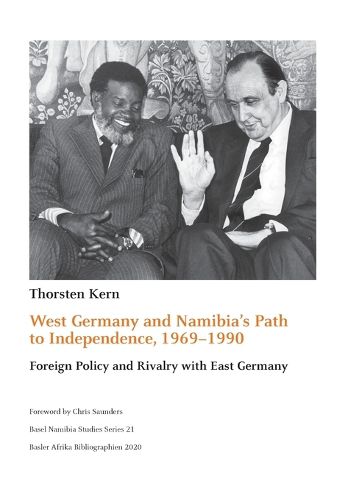Readings Newsletter
Become a Readings Member to make your shopping experience even easier.
Sign in or sign up for free!
You’re not far away from qualifying for FREE standard shipping within Australia
You’ve qualified for FREE standard shipping within Australia
The cart is loading…






This title is printed to order. This book may have been self-published. If so, we cannot guarantee the quality of the content. In the main most books will have gone through the editing process however some may not. We therefore suggest that you be aware of this before ordering this book. If in doubt check either the author or publisher’s details as we are unable to accept any returns unless they are faulty. Please contact us if you have any questions.
Namibia’s main liberation movement, the South West Africa People’s Organisation (SWAPO), relied heavily on outside support for its armed struggle against South Africa’s occupation of what it called South West Africa. While East Germany’s solidarity with Namibia’s struggle for national self-determination has received attention, little research has been done on West Germany’s policy towards Namibia, which must be seen against the backdrop of inter-German rivalry. The impact of the wider realities of the Cold War on Namibia’s rocky path to independence leaves ample room for research and new interpretations. In West Germany and Namibia’s Path to Independence, 1969-1990: Foreign Policy and Rivalry with East Germany, Thorsten Kern shows that German division played a vital role in West Germany’s position towards Namibia during the Cold War. West German foreign policy towards Namibia, at the height of the Namibian liberation struggle, is investigated and discussed against the backdrop of rivalry with East Germany. The two states’ deeply diverging policies, characterised in this context by competition for infuence over SWAPO, were strongly affected by the Cold War rivalry between the capitalist West and the communist East. Yet ultimately the dynamics of rapprochement helped to bring about Namibia’s independence.
This book is based upon a doctoral dissertation presented to the University of Cape Town in 2016. Kern conducted research in the National Archives of Namibia and in German archives and his work draws on interviews with contemporary witnesses.
$9.00 standard shipping within Australia
FREE standard shipping within Australia for orders over $100.00
Express & International shipping calculated at checkout
This title is printed to order. This book may have been self-published. If so, we cannot guarantee the quality of the content. In the main most books will have gone through the editing process however some may not. We therefore suggest that you be aware of this before ordering this book. If in doubt check either the author or publisher’s details as we are unable to accept any returns unless they are faulty. Please contact us if you have any questions.
Namibia’s main liberation movement, the South West Africa People’s Organisation (SWAPO), relied heavily on outside support for its armed struggle against South Africa’s occupation of what it called South West Africa. While East Germany’s solidarity with Namibia’s struggle for national self-determination has received attention, little research has been done on West Germany’s policy towards Namibia, which must be seen against the backdrop of inter-German rivalry. The impact of the wider realities of the Cold War on Namibia’s rocky path to independence leaves ample room for research and new interpretations. In West Germany and Namibia’s Path to Independence, 1969-1990: Foreign Policy and Rivalry with East Germany, Thorsten Kern shows that German division played a vital role in West Germany’s position towards Namibia during the Cold War. West German foreign policy towards Namibia, at the height of the Namibian liberation struggle, is investigated and discussed against the backdrop of rivalry with East Germany. The two states’ deeply diverging policies, characterised in this context by competition for infuence over SWAPO, were strongly affected by the Cold War rivalry between the capitalist West and the communist East. Yet ultimately the dynamics of rapprochement helped to bring about Namibia’s independence.
This book is based upon a doctoral dissertation presented to the University of Cape Town in 2016. Kern conducted research in the National Archives of Namibia and in German archives and his work draws on interviews with contemporary witnesses.